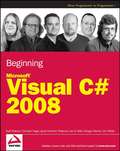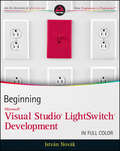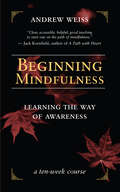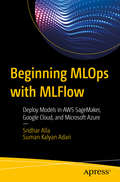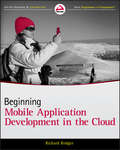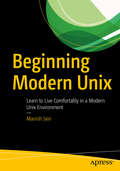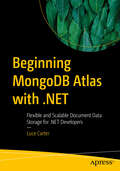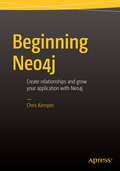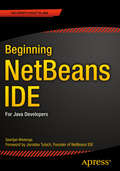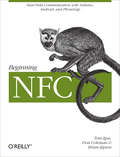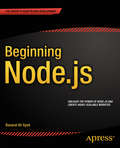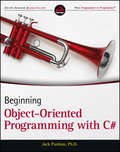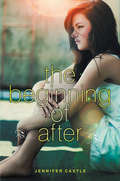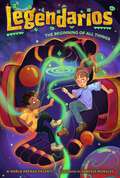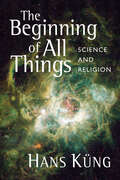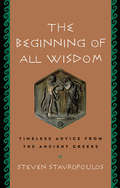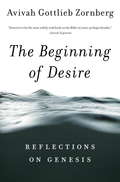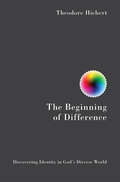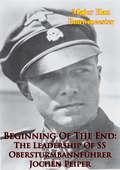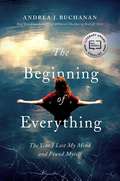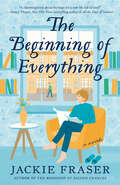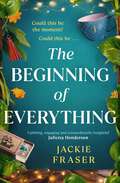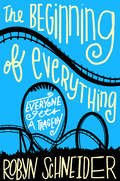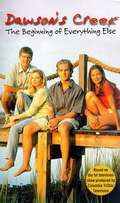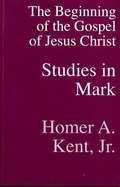- Table View
- List View
Beginning Microsoft Visual C# 2008
by Jacob Hammer Pedersen Jon D. Reid Christian Nagel Eric White Morgan Skinner Karli WatsonThe book is aimed at novice programmers who wish to learn programming with C# and the .NET framework. The book starts with absolute programming basics. It then moves into Web and Windows programming, data access (databases and XML), and more advanced technologies such as graphics programming with GDI+ and basic networking. The book is divided into sections including:The C# Language: Basic language skills using console application. Content moves from the absolute basics to fairly involved OOP skills.Windows Vista Programming: Using basic Windows applications, reinforcing earlier OOP and debugging skills.Web Programming: Putting together basic Web applications, highlighting differences between Web and Windows programming.Data Access: Accessing all kinds of data sources from Web and Windows applications, including SQL usage, XML, file system data, and Web Services.Additional Techniques: "The fun stuff", including Windows Presentation Foundation, Windows Workflow, Windows Communication Foundation, GDI+, networking, Windows Services, and so on.The book makes complicated subjects seem easy to learn, and it inspires readers to investigate areas further on their own by providing references to additional material, and exercise questions that require significant effort and personal research to complete.
Beginning Microsoft Visual Studio LightSwitch Development
by István NovákLearn how LightSwitch can accelerate and simplify application developmentAs Microsoft's newest offering for simplifying application development, LightSwitch opens the development door to creating applications without writing code. This introductory, full-color book shows you how to quickly create, modify, and distribute information for your business with LightSwitch. Packed with simple example programs, this beginner-level resource guides you through a complete small business application using LightSwitch to demonstrate the capabilities of this exciting new tool.You'll explore the most common application development issues that developers encounter on a daily basis and learn how LightSwitch makes them easier to handle with solutions that streamline application development without requiring code. Gets you started with Visual Studio LightSwitch, Microsoft's newest offering for simplifying application developmentShows you how to prepare a LightSwitch application and looks at the technologies behind a LightSwitch applicationAddresses working with simple data screens, working with master-detail data screens, and using exciting SQL server dataLooks at deploying applications, using SharePoint 2010 lists, and extending Visual Studio LightSwitchIf you're ready to simplify the application development process without writing a piece of code, then this is the book for you!
Beginning Mindfulness: Learning the Way of Awareness
by Andrew WeissA Simple Manual That Really Works Knowing that most people do not stop their lives to engage in spiritual practice, Buddhist teacher Andrew Weiss has always taught the direct application of practice to daily life. While also teaching sitting and walking meditation, he emphasizes mindfulness — the practice of seeing every action as an opportunity to awaken meditative inquiry. Over the years, Andrew has honed his teachings into an effective ten-week course with progressive steps and home-play assignments. Beginning Mindfulness is intended for anyone practicing in daily life without the luxury of long meditation retreats. Weiss skillfully blends the traditions of his teachers into an easy and humorous program of learning the Buddhist art of mindfulness.
Beginning MLOps with MLFlow: Deploy Models in AWS SageMaker, Google Cloud, and Microsoft Azure
by Sridhar Alla Suman Kalyan AdariIntegrate MLOps principles into existing or future projects using MLFlow, operationalize your models, and deploy them in AWS SageMaker, Google Cloud, and Microsoft Azure. This book guides you through the process of data analysis, model construction, and training.The authors begin by introducing you to basic data analysis on a credit card data set and teach you how to analyze the features and their relationships to the target variable. You will learn how to build logistic regression models in scikit-learn and PySpark, and you will go through the process of hyperparameter tuning with a validation data set. You will explore three different deployment setups of machine learning models with varying levels of automation to help you better understand MLOps. MLFlow is covered and you will explore how to integrate MLOps into your existing code, allowing you to easily track metrics, parameters, graphs, and models. You will be guided through the process of deploying and querying your models with AWS SageMaker, Google Cloud, and Microsoft Azure. And you will learn how to integrate your MLOps setups using Databricks. What You Will Learn Perform basic data analysis and construct models in scikit-learn and PySparkTrain, test, and validate your models (hyperparameter tuning)Know what MLOps is and what an ideal MLOps setup looks likeEasily integrate MLFlow into your existing or future projectsDeploy your models and perform predictions with them on the cloud Who This Book Is ForData scientists and machine learning engineers who want to learn MLOps and know how to operationalize their models
Beginning Mobile Application Development in the Cloud
by Richard RodgerLearn how to build apps for mobile devices on Cloud platforms The marketplace for apps is ever expanding, increasing the potential to make money. With this guide, you'll learn how to build cross-platform applications for mobile devices that are supported by the power of Cloud-based services such as Amazon Web Services. An introduction to Cloud-based applications explains how to use HTML5 to create cross-platform mobile apps and then use Cloud services to enhance those apps. You'll learn how to build your first app with HTML5 and set it up in the Cloud, while also discovering how to use jQuery to your advantage.Highlights the skills and knowledge you need to create successful apps for mobile devices with HTML5Takes you through the steps for building web applications for the iPhone and AndroidDetails how to enhance your app through faster launching, touch vs. click, storage capabilities, and a cacheLooks at how best to use JSON, FourSquare, jQuery, AJAX, and moreShares tips for creating hybrid apps that run nativelyIf you're interested in having your application be one of the 200,000+ apps featured in the iPhone store or the 50,000+ in the Android store, then you need this book.
Beginning Modern Unix: Learn to Live Comfortably in a Modern Unix Environment
by Manish JainDiscover how to leverage modern Unix even if you’ve never worked with Unix before. This book presents everything in conceptual terms that you can understand, rather than tips to be committed raw to memory. You will learn everyday tasks ranging from basic system administration—partitioning and mounting filesystems, software installation, network configuration, working from the command line) — to Bourne shell scripting, using graphical applications, as well as fanciful things such as emulation layers for Windows and Linux and virtualization with VirtualBox. It’s now 50 years since the creation of Unix but it is still growing. As Unix now moves to everyone's OS (open-source FreeBSD/Linux), it is the perfect time to start your journey with Beginning Modern Unix as your guide. What You'll Learn Live comfortably in a modern Unix environment, both on the command-line and in the graphical world. Choose the right hardware for UnixWork with Unix in real world settingsDevelop Unix applicationsReview advanced techniques in Shell scriptingWho This Book Is ForEveryone who uses a computer – those who intend to migrate to Unix as well as those who are worried about migrating to Unix, perhaps fearing it is a pure command-line or ‘difficult’ world.
Beginning MongoDB Atlas with .NET: Flexible and Scalable Document Data Storage for .NET Developers
by Luce CarterThis book is a tutorial on MongoDB customized for developers working in Microsoft .NET 6, .NET 7, and beyond. It explains the differences between relational database systems and the document model supported by MongoDB, and shows how to build .NET applications that run against a MongoDB database, especially one in the cloud. Author Luce Carter kicks things off by teaching you how to determine when to use a document database versus a relational engine. After that, she walks you through building a Microsoft .NET project combining the MongoDB Atlas cloud database as a service solution with a .NET. application. In the process, you will learn how to create, read, update, and delete data in MongoDB from any .NET project. You will come away from this book with a solid understanding of MongoDB’s Developer Data Platform and how to use it from your .NET applications. You’ll be able to connect to MongoDB in the cloud and take advantage of the flexibility and scalability that MongoDB’s document storage model provides, and you’ll understand how to craft your applications to run using document storage and the MongoDB database engine. What You Will Learn Know when to use the MongoDB document model Build .NET applications that connect to MongoDB for data storage Create MongoDB clusters on the MongoDB Atlas cloud platform Store data in MongoDB Atlas Create, Read, Update, and Delete (CRUD) data from .NET Web API projects Test your CRUD endpoints using RESTful operations Validate schemas to help protect against breaking changes Who This Book Is For .NET developers who are looking for an alternative to relational databases, and those looking for a flexible and scalable document storage solution for use from .NET applications. Additionally, anyone wanting to learn MongoDB in the context of .NET and C# will benefit from this book.
Beginning Neo4j
by Chris KemperThis book is your introduction in the world of graph databases, and the benefits they can bring to your applications. Neo4j is the most established graph database on the market, and it's always improving to bring more of its benefits to you. Beginning Neo4j will take you from the installation of Neo4j through to building a full application with Neo4j at its heart, and everything in between. Using this book, you'll get everything up and running, and then learn how to use Neo4j to build up recommendations, relationships, and calculate the shortest route between two locations. With example data models, and an application putting everything together, this book will give you everything you need to really get started with Neo4j. Neo4j is being used by social media and ecommerce industry giants. You can take advantage of Neo4j's powerful features and benefits - add Beginning Neo4j to your library today. What you'll learn Learn what Neo4j is and methods on how to install it Using Cypher, Neo4js query language to retrieve data Example data structures to help shape your application How to create relationships and recommendations between data Create an application that uses PHP and Neo4j together Taking your new Neo4j application into production Use Neo4j to calculate the shortest path between two locations Who this book is for This book is for anyone who wants to get started with graph databases, and doesn't know where to start. Table of Contents Chapter One: Introduction to Graph Databases Chapter Two: Getting to Know Neo4j Chapter Three: Get Up and Running with Neo4j Chapter Four: Meet Cypher Chapter Five: Managing Your Data in Neo4j Chapter Six: Importing and Exporting Data Chapter Seven: Using Data in Neo4j Chapter Eight: Building an App in Neo4j Chapter Nine: Neo4j in Production
Beginning NetBeans IDE: For Java Developers
by Geertjan WielengaBeginning NetBeans IDE is your authoritative guide for getting started learning and using the free and open source NetBeans IDE. Written by Geertjan Wielenga, who has worked on the NetBeans Team since 2004, it shows you what the IDE is all about and how to use it with real-world case studies built from the ground up as you learn all about the IDE. In this book, you get a tour of the various, essential, and key NetBeans features, including a range of wizards and plug-ins. Then, you start building a more complex Java EE-based application using Maven with the NetBeans IDE. And, you learn how to improve that application by exploring the NetBeans refactoring, testing, debugging, and profiling tools. After reading and using this guide, you'll come away with a working case study and many insights into how to understand and optimally make use of NetBeans IDE. What you'll learn What is NetBeans and how to use it How to install and set up your NetBeans IDE and environment How to write your first Java application using NetBeans How to explore the key NetBeans wizards and plug-ins How to build a complex Java EE-based application using Maven with NetBeans How to improve applications by refactoring, testing, debugging, and profiling Who this book is for This book is for those who are new to NetBeans who may have prior Java coding experience. Table of Contents 1. Installing and Setting Up 2. Getting Started 3. Java Editor 4. Using Wizards and Plugins 5. Putting the Pieces Together 6. Analysis and Refactoring 7. Testing and Code Quality 8. Debugging 9. Profiling and Tuning 10. Versioning
Beginning NFC: Near Field Communication with Arduino, Android, and PhoneGap
by Tom Igoe Don Coleman Brian JepsonJump into the world of Near Field Communications (NFC), the fast-growing technology that lets devices in close proximity exchange data, using radio signals. With lots of examples, sample code, exercises, and step-by-step projects, this hands-on guide shows you how to build NFC applications for Android, the Arduino microcontroller, and embedded Linux devices.You’ll learn how to write apps using the NFC Data Exchange Format (NDEF) in PhoneGap, Arduino, and node.js that help devices read messages from passive NFC tags and exchange data with other NFC-enabled devices. If you know HTML and JavaScript, you’re ready to start with NFC.Dig into NFC’s architecture, and learn how it’s related to RFIDWrite sample apps for Android with PhoneGap and its NFC pluginDive into NDEF: examine existing tag-writer apps and build your ownListen for and filter NDEF messages, using PhoneGap event listenersBuild a full Android app to control lights and music in your homeCreate a hotel registration app with Arduino, from check-in to door lockWrite peer-to-peer NFC messages between two Android devicesExplore embedded Linux applications, using examples on Raspberry Pi and BeagleBone
Beginning Node.js
by Basarat Ali SyedBeginning Node. js is your step-by-step guide to learning all the aspects of creating maintainable Node. js applications. You will see how Node. js is focused on creating high-performing, highly-scalable websites, and how easy it is to get started. Many front-end devs regularly work with HTML, CSS, PHP, even WordPress, but haven't yet got started with Node. js. This book explains everything for you from a beginner level, enabling you to start using Node. js in your projects right away. Using this book you will learn important Node. js concepts for server-side programming. You will begin with an easy-to-follow pure JavaScript primer, which you can skip if you're confident of your JS skills. You'll then delve into Node. js concepts such as streams and events, and the technology involved in building full-stack Node. js applications. You'll also learn how to test your Node. js code, and deploy your Node. js applications on the internet. Node. js is a great and simple platform to work with. It is lightweight, easy to deploy and manage. You will see how using Node. js can be a fun and rewarding experience - start today with Beginning Node. js. What you'll learn * Learn how JavaScript can help you be highly productive as a full-stack developer * How to set up an end to end Node. js development environment * Learn how to create reusable and maintainable Node. js modules * Patterns for sharing code between the server and the client * Create Node. js restful web services and websites * Store and retrieve your data using Document Databases * How to test your Node. js applications * How to deploy your applications on the internet Who this book is for Beginning Node. js is great for front-end developers looking to use Node. js in their websites. If you understand the basics of programming this book will teach you how you can leverage JavaScript to create full stack web-apps using Node. js. Node. js allows you to write code that runs both on the client and server. This allows you to reuse more code and deliver applications faster. From this book you will learn how to write maintainable server-side JavaScript using Node. js, how to test your code and deploy it on the internet. Table of Contents Chapter 1: Setting up for Node. js Development Chapter 2: Understanding Node. js Chapter 3: Core Node. js Chapter 4: Node. js Packages Chapter 5: Events and Streams Chapter 6: Getting Started with HTTP Chapter 7: Introducing Express Chapter 8: Persisting Data Chapter 9: Front-End Basics Chapter 10: Simplifying Callbacks Chapter 11: Debugging Chapter 12: Testing Chapter 13: Deployment and Scalability
Beginning Object-Oriented Programming with C#
by Jack PurdumThe ideal beginner's guide to C# and object-oriented programmingWrox beginners' guides have the perfect formula for getting programming newcomers up and running. This one introduces beginners to object-oriented programming using C# to demonstrate all of the core constructs of this programming framework. Using real-world situations, you'll discover how to create, test, and deliver your programs and how to work with classes, arrays, collections, and all the elements of object-oriented programming.Covers exactly what beginners, even those with no prior programming experience, need to know to understand object-oriented programming and start writing programs in C# Explains the advantages and disadvantages of C#, and tips for understanding C# syntax Explores properties, encapsulation, and classes; value data types; operands and operators; errors and debugging; variables; and reference types Shows how to use statement repetition and program loops, understand arrays and collections, and write your own classes Also covers inheritance and polymorphismBeginning Object-Oriented Programming with C# uses the tried-and-true Wrox formula for making this popular programming method easy to learn.
The Beginning of After
by Jennifer CastleAnyone who's had something truly crappy happen to them will tell you: It's all about Before and After. What I'm talking about here is the ka-pow, shake-you-to-your-core-and-turn-your-bones-to-plastic kind of crappy. Sixteen-year-old Laurel's world changes instantly when her parents and brother are killed in a terrible car accident. Behind the wheel is the father of her bad-boy neighbor, David Kaufman, whose mother is also killed. In the aftermath of the tragedy, Laurel navigates a new reality in which she and her best friend grow apart, boys may or may not be approaching her out of pity, overpowering memories lurk everywhere, and Mr. Kaufman is comatose but still very much alive. Through it all there is David, who swoops in and out of Laurel's life and to whom she finds herself attracted against her better judgment. She will forever be connected to him by their mutual loss-a connection that will change them both in unexpected ways. Jennifer Castle's debut novel is a heart-wrenching, surprisingly witty testament to how drastically life can change in the span of a single moment.
The Beginning of All Things (Legendarios #2)
by Karla Arenas ValentiTwins Emma and Martín get stuck at the beginning of time in this second book in the Legendarios chapter book series that&’s Magic Tree House meets Heroes in Training! Emma and Martín are settling into their new home in Chicago and getting ready to start at their new school. When they learn they&’ll be in separate classes for the first time, they aren&’t sure they can face so much change alone. But when life gets stressful, the siblings now have the perfect escape—into the book of legends! They enter the creation story of when the giant Ometecuhtli made the world. As soon as they arrive, they realize they have a major problem: it takes a magical object to activate Emma&’s necklace and open the portal home, but how can they find one when nothing exists yet?
The Beginning of All Things: Science and Religion
by Hans KüngTranslated by John Bowden In an age when faith and science seem constantly to clash, can theologians and scientists come to a meeting of minds? Yes, maintains the intrepid Hans Küng, as he brilliantly argues here that religion and science are not mutually exclusive but complementary. Focusing on beginnings -- beginnings of time, of the world, of man, of human will -- Küng deals with an array of scientific precepts and teachings. From a unified field theory to quantum physics to the Big Bang to the theory of relativity -- even superstring and chaos theories -- he examines all of the theories regarding the beginning of the universe and life (of all kinds) in that universe. Küng seeks to reconcile theology with the latest scientific insights, holding that "a confrontational model for the relationship between science and theology is out of date, whether put forward by fundamentalist believers and theologians or by rationalistic scientists and philosophers." While accepting evolution as scientists generally describe it, he still maintains a role for God in founding the laws of nature by which life evolved and in facilitating the adventure of creation. Exhibiting little patience for scientists who do not see beyond the limits of their discipline or for believers who try to tell experts how things must have been, Küng challenges readers to think more deeply about the beginnings in order to facilitate a new beginning in dialogue and understanding.
The Beginning of All Wisdom: Timeless Advice from the Ancient Greeks
by Steven StavropoulosWho knew the ancient Greeks had it all figured out three thousand years ago? In The Beginning of All Wisdom, author Steve Stavropoulos has sifted through nearly every recorded ancient Greek text for the very best sayings, proverbs, and maxims by ancient Greek philosophers, tragedians, scientists, politicians, generals, and poets, from Plato and Pericles to Socrates and Sophocles. Here is practical advice on everyday problems as well as answers to deep moral questions: ?Getting to know yourself is extremely difficultOCO (Thales). ?Ignorance is a tough evil to conquerOCO (Sophocles). ?We must take care of our minds because we cannot benefit from beauty when our brains are missing. OCO (Euripides). Organized into 100 topics that cover all human experience?anger, fear, good and evil, truth, prayer and hope, aging and old age, friendship, gossip, pain and sorrow, self-deception, war and peace, public speaking, democracy?The Beginning of All Wisdom inspires, advises, and satisfies the urge to learn the best the ancient Greeks have to teach?without having to read through a whole shelf of Loeb classics. "
The Beginning of Desire: Reflections on Genesis
by Avivah Gottlieb ZornbergWinner of the National Jewish Book Award Since its publication in 1995,The Beginning of Desirehas opened new pathways in the reading of the Bible. Avivah Gottlieb Zornberg#x19;s innovative use of midrash, literature, philosophy, and psychoanalysis draws deeply upon the familiar biblical narratives to produce interpretations that are at once startlingly beautiful and completely authentic. Illuminating the tensions that grip human beings as they search for an encounter with God, Zornberg gives us a brilliant analysis of the stories of Adam and Eve; Noah; Abraham and Sarah; Isaac and Rebecca; Jacob, Rachel, and Leah; and Joseph and his brothers.
The Beginning of Difference: Discovering Identity in God's Diverse World
by Theodore HiebertDifference can enrich us or tear us apart. Difference can make our lives stronger, fuller, and richer or it can destroy them. Therefore, how we engage difference matters. Conflicts between different peoples around the world, the movement of refugees from nation to nation, tensions over immigration, and growing diversity within our society bring difference to our doorstep daily. We can engage people who are different constructively and compassionately, or we can allow the fear of difference to distance us from others and to demonize them. At a time when racial, ethnic, cultural, and religious differences have created heightened tensions, we need more than ever to find our bearings. We need to re-examine what we think about difference. Author Theodore "Ted" Hiebert re-examines the Bible’s stories explaining difference and its beginnings in the book of Genesis, exposing the inclination to interpret these stories as a negative view of difference. These stories recognize difference as God’s intention for the world, providing us with constructive resources of living with difference today. Hiebert starts with the story of "The Tower of Babel" and moves beyond it to examine how Genesis’s writers saw their unique identity and role in the world not as separate from all others but as members of the human family of which they were a part. He presents how biblical characters lived with difference and how the first Christians embraced difference. Finally, he invites the reader into new conversations about our biblical traditions that reveal a respect for difference, a generosity toward others, a desire to include rather than exclude, and a continuing interest in negotiating difference in ways that build relationships rather than destroy them.
Beginning Of The End: The Leadership Of SS Obersturmbannführer Jochen Peiper
by Major Han BouwmeesterSS Obersturmbannführer Jochen Peiper was one of Germany 's most colorful military leaders of World War II with an audacious reputation. The name Peiper will always be linked to the Malmédy Massacre, the death of Belgian civilians and more than seventy American soldiers, but there is still a myth around Peiper. Why was a twenty-nine year old Waffen-SS officer chosen to lead the German spearhead unit during the Battle of the Bulge in December 1944? Peiper was a special leader within the one of the most elite Waffen-SS divisions, the Leibstandarte-SS Adolf Hitler. Peiper was charismatic and extreme loyal to his unit. His men trusted him as a leader, even under the most extreme conditions. In Germany he was a well-known war hero. It was a logical decision that Peiper became the commander of the spearhead unit, but there were other factors leading to this decision: tactical considerations, a we-know-what-to-expect-principle, and Peiper was lucky that he was still alive and serving in the Waffen-SS.
The Beginning of Everything: The Year I Lost My Mind And Found Myself
by Andrea J. BuchananA real-life neurological mystery?and captivating story of reinvention by the New York Times bestselling author of The Daring Book for Girls. Andrea Buchanan lost her mind while crossing the street one blustery March morning. The cold winter air triggered a coughing fit, and she began to choke. She was choking on a lot that day. A sick son. A pending divorce. The guilt of failing as a partner and as a mother. When the coughing finally stopped, she thought it was over. She could not have been more wrong. When she coughed that morning, a small tear ripped through her dura mater, the membrane covering the brain and spinal cord. But she didn’t know that yet. Instead, Andrea went on with her day, unaware that her cerebrospinal fluid was already beginning to leak out of that tiny opening. What followed was nine months of pain and confusion as her brain, no longer cushioned by a healthy waterbed of fluid, sank in her skull. At a time in her life when she needed to be as clear-thinking as possible?as a writer, as a mother, as a woman attempting to strike out on her own after two decades of marriage?she was plagued by cognitive impairment and constant pain, trapped by her own brain—all while mystifying doctors and pushing the limits of medical understanding. In this luminous and moving narrative, Andrea reveals the astonishing story of this tumultuous year—her fraught search for treatment; how patients, especially women, fight to be seen as reliable narrators of their own experiences; and how her life-altering recovery process affected both her and her family. The mind-brain connection is one of the greatest mysteries of the human condition. In some folklore, the cerebrospinal fluid around the brain is thought to be the place where consciousness actually begins. Here, in the pages of The Beginning of Everything, Andrea seeks to understand: Where was “I” when I wasn’t there?
The Beginning of Everything: A Novel
by Jackie FraserAn irresistible friends-to-lovers novel of resilience, hope, and new beginnings from the author of The Bookshop of Second Chances &“A charming book about hope for a new life full of love!&”—Nancy Thayer, New York Times bestselling author of All the Days of SummerAfter escaping a bad relationship, Jess Cavendish is running and leaving it all behind, carrying just a few treasured belongings in her knapsack. She needs to start over, but that means sleeping where she can and making the most of her slim savings. Luckily, she comes across a recently sold, unoccupied house. It couldn&’t hurt to stay there while she saves up enough to get her own place, right?Gethin Thomas is also looking to move on after the end of a long-term relationship. He&’s returned to his hometown, anxious to renovate the fixer-upper he bought and move out of his sister&’s cramped guest room. When he walks through the door one morning, he finds Jess, who&’s ready to run again, and surprises them both by offering to let her stay. It feels like the right thing to do, but Jess doesn&’t want a handout. They strike a bargain: Jess will help with the restoration, furnishing, and decorating in exchange for room and board.While they peel wallpaper and shop for new furniture, an unexpected friendship develops as they bond over music and food, and slowly open up to each other about their pasts. When it&’s time for Gethin to move in, he convinces Jess to be his official housemate and she agrees—so long as he lets her pay rent. The connection between them soon shifts to an attraction that seems both inevitable and overwhelming, and Jess must decide what she wants. With so much hurt in her past, can she risk loving again? She was brave enough to reach for a new life—and now a future she hadn&’t even dreamed possible could be just within her grasp.
The Beginning of Everything: An irresistible novel of resilience, hope and unexpected friendships
by Jackie FraserBeautiful, heartbreaking, often very funny and entirely unforgettable, The Beginning of Everything is the irresistible new novel from the bestselling author of The Bookshop of Second Chances. 'Raw, real and highly relatable, The Beginning of Everything is a keen observation on humanity and the tenuous nature of modern life. Jess and Gethin's gentle, layered friendship is at the wonderful heart of a warm, witty story about courage, kindness and love in all its forms. Uplifting, engaging and extraordinarily insightful!' JULIETTA HENDERSON'Equal parts hilarious and sobworthy, it's a poignant tale of what it means to rebuild after losing everything' JESSICA RYN 'Hugely enjoyable&’ KATIE FFORDE For fans of The Keeper of Stories, The Wisdom of Sally Red Shoes and A Thousand Roads Home, The Beginning of Everything is the story of Jess and Gethin, whose paths cross in the most unexpected way. Jess is running, leaving all she knows and everyone she loves behind her, with just a few treasured belongings in her rucksack. She&’s escaping from the pain and trauma of a bad relationship with a bad man, gone very badly wrong. Gethin&’s kindness and care takes her breath away. They become friends. But with so much hurt in her past, can Jess learn to love and live again?
The Beginning of Everything: The Beginning Of Everything; How To Love; Maybe One Day
by Robyn SchneiderRobyn Schneiders The Beginning of Everything is a witty and heart-wrenching teen novel that will appeal to fans of books by John Green and Ned Vizzini, novels such as The Perks of Being a Wallflower, and classics like The Great Gatsby and The Catcher in the Rye. Varsity Tennis captain Ezra Faulkner was supposed to be homecoming king, but that was before--before his girlfriend cheated on him, before a car accident shattered his leg, and before he fell in love with unpredictable new girl Cassidy Thorpe. As Kirkus said in a starred review, "Schneider takes familiar stereotypes and infuses them with plenty of depth. Here are teens who could easily trade barbs and double entendres with the characters that fill John Greens novels. "Funny, smart, and including everything from flash mobs to blanket forts to a poodle who just might be the reincarnation of Jay Gatsby, The Beginning of Everything is a refreshing contemporary twist on the classic coming of age novel--a heart-wrenching story about how difficult it is to play the part that people expect, and how new beginnings can stem from abrupt and tragic endings.
The Beginning Of Everything Else (Dawson's Creek)
by Jennifer BakerSometimes life happens even when you're not sure you're ready for it. In Capeside, the sleepy New England coastal town where teenagers Joey, Dawson, Pacey, and Jen live, this year the river is running fast. Choices will be made, and chances will be taken. Promises will be broken, and desires revealed. Joey, Dawson, Pacey, Jen. Four fifteen-year-olds ready to take on the world. They're learning about life, and learning how to love.
Beginning Of The Gospel Of Jesus Christ: Studies In Mark (Kent Collection)
by Homer KentThis installment of The Kent Collection is a commentary that has been extensively rewritten and expanded from the author’s previous smaller work on Mark. A careful outline keeps the reader from getting lost in the great number of events portrayed in this shortest of the Gospels. Photographs aid in understanding the geographical setting of many events.
